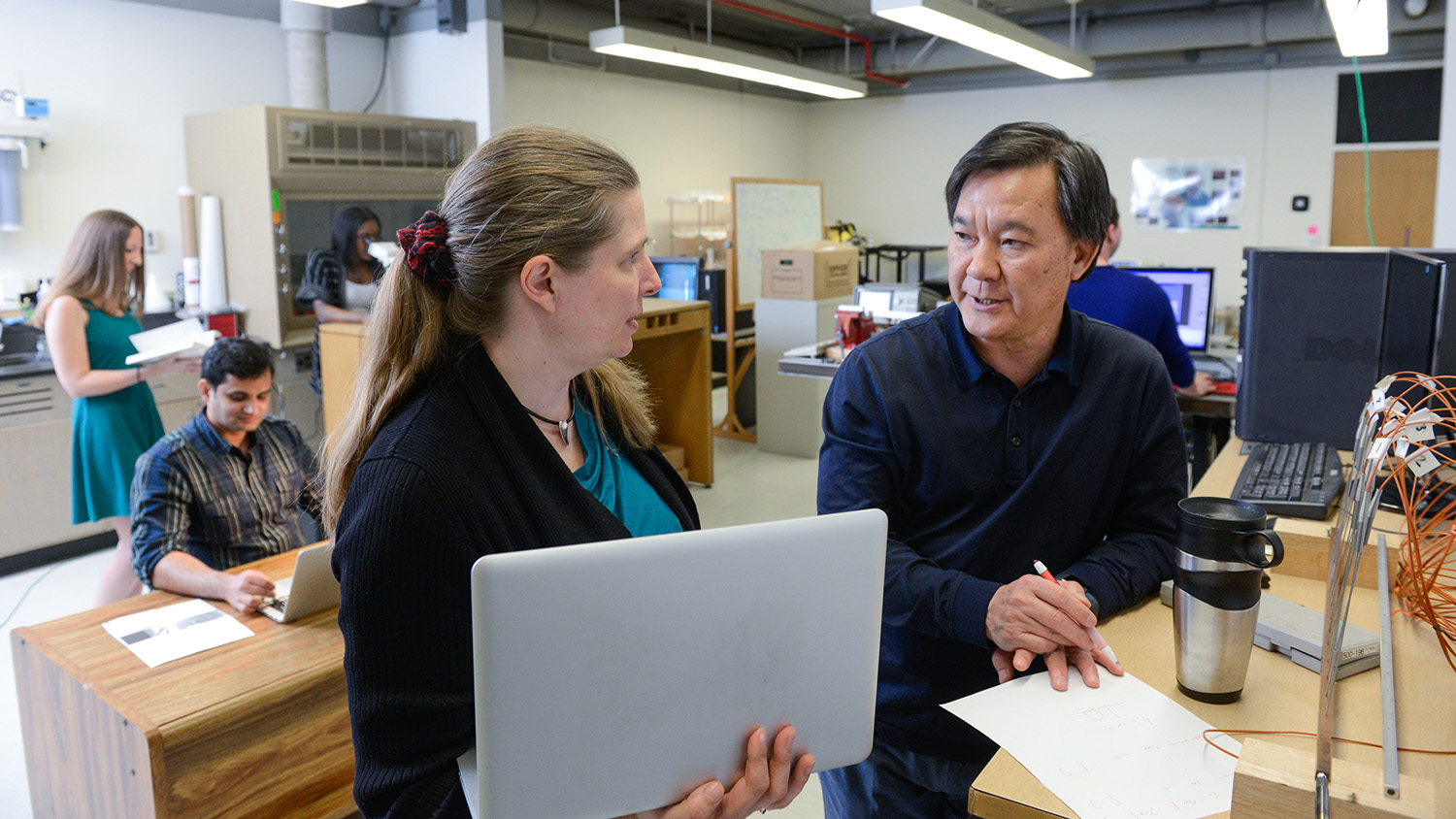Survey Gauges Faculty Job Satisfaction

NC State faculty move the university forward through their dedication to teaching, research and innovation. In turn, NC State seeks to support faculty through continual improvement of recruitment, retention and professional development initiatives. The university’s participation in the Collaborative on Academic Careers in Higher Education (COACHE) survey reinforces a strong commitment to faculty success.
A Collaborative Relationship
Part of the Harvard Graduate School of Education, COACHE is a “research-practice partnership and network of peer institutions dedicated to improving outcomes in faculty recruitment, development, and retention.” This group of more than 300 higher education institutions helps improve faculty success through a variety of methods, including the COACHE Faculty Job Satisfaction Survey.
The Office of Institutional Research and Planning’s Survey Research unit coordinates the university’s participation in the survey every three years to better understand faculty needs and improve the overall faculty experience. The survey is sent to all faculty, and consists of 200 items covering everything from overall job satisfaction to transparency in communications, achieving tenure, professional development and more.
Faculty Findings
University faculty last took the COACHE Faculty Job Satisfaction Survey in spring 2018, with 49% of tenure track and professional track faculty participating. For nearly half of the survey items, NC State ranked in the top third among all participating universities nationally for faculty satisfaction.
NC State received the most favorable overall ratings on topics related to teaching, department collegiality, leadership and quality, and promotion and tenure clarity (pre-tenure only). Additionally, 84% of university faculty taking the survey reported being “very satisfied” or “satisfied” with the intellectual vitality of pre-tenure faculty in the department.
Compared to peer institutions — Georgia Tech, Iowa State, Purdue, UC Davis and Virginia Tech — NC State ranked favorably on university leadership, classrooms and library resources.
“We’re very encouraged by the feedback our faculty gave in the COACHE survey,” said Executive Vice Chancellor and Provost Warwick Arden. “What we’re hearing is that faculty generally see the university as a great place to work, and they’re excited about their new faculty colleagues as well.”
Opportunities for Growth
Of course, the COACHE Faculty Job Satisfaction Survey also uncovers opportunities for the university to grow and better serve faculty.
In their survey responses, faculty showed high interest in interdisciplinary work, but felt that the university could do more to support and reward interdisciplinary faculty. Faculty also expressed a strong desire for NC State to provide more resources and support for faculty mentoring other faculty.
“We take the COACHE survey, and other opportunities to hear from our faculty, very seriously,” said Katharine Stewart, Vice Provost for Faculty Affairs. “We are open to ideas from all faculty on how NC State can improve satisfaction with mentoring and interdisciplinary work. The strategic planning effort is a great way to share those as well.”
Faculty Moving Forward
The COACHE Faculty Job Satisfaction Survey results revealed that many NC State faculty have questions about where to go to ask questions, give feedback and raise concerns about policy-related issues. Faculty and the university can work together to answer those questions — NC State’s Office of Faculty Affairs and Faculty Senate are good places to start. NC State also maintains a policy manual with details on every university policy that impacts faculty and their career trajectory.
The Office of the Executive Vice Chancellor and Provost recently addressed the issue of providing more support for faculty recognition through the hiring of Maria Almanza as the Director of External Faculty Awards and Recognition. Almanza supports NC State faculty as they apply to regional, state, national and international awards, and to further celebrate and promote the excellent work of NC State faculty.
Faculty will have an opportunity to shape their future — and focus on aspects of faculty life that were highlighted by the COACHE Faculty Job Satisfaction Survey results — in the upcoming strategic planning process. Through this process, faculty can give feedback to university leadership to shape NC State’s future through faculty senate meetings, department head meetings and more.
Faculty can also contact their designated campus representative to submit ideas for the upcoming strategic plan. The next major survey initiative in which faculty will have an opportunity to participate is the UNC System’s Employee Engagement Survey in February 2020, then the COACHE Faculty Job Satisfaction Survey in 2021. Through a process of asking questions, giving feedback and collaborating with leaders and colleagues, faculty can build a better future for themselves and for NC State.
- Categories:



It should be mentioned that parts of the COACHE survey of NCSU are not positive. In the 2011-2012 COACHE survey, 49% of the non-tenured faculty at NCSU complained that “compensation” was the “worst thing” about working at NCSU. The current COACHE survey indicates that it has gotten worse: now 70.9% of NTT faculty (now called “professional track” faculty) say that “compensation” is the “worst aspect of work” at NCSU. The increasing frustration of this essential portion of the NCSU faculty — in CHASS, it is responsible for 42% of the teaching — is fully justified. In January 2019, the NCSU Faculty Senate, recognizing the extent of this shameful and well-documented exploitation, recommended that a minimum level of compensation be established. It should be the top priority of the NCSU administration.
Thank you for your comment. We are unable to identify the source of the 70.9% figure you cite in the 2018 COACHE results. We find instead that 40.7% of Professional Faculty responded in 2018 that compensation was one of the two worst aspects of working at NC State – an improvement over the 2011-2012 COACHE survey results for this same population. The figure we cite can be found on the last page of the Professional Track Faculty Overall report, found under the Frequencies section of the 2018 COACHE website. That said, we agree that NC State has opportunities to ensure that our Professional Faculty are compensated at levels that are both fair and regionally competitive. In recent months, the Provost has been reviewing institutional data on this very question. He will soon engage our deans in decisions regarding minimum compensation levels for Professional Faculty of various ranks. We look forward to sharing more about this with the university community in the near future.
Thank you for your response. I can’t find the 40.7% figure that you mention. In the copy of the report that I have “professional track faculty” respond to queried about compensation in two different places. On page 3, when asked whether there was “Satisfaction with salary,” 37.5% responded “dissatisfied” and 31.3% responded “very dissatisfied”; that is, 68.8% were dissatisfied or very dissatisfied. On page 11, when asked about the “Worst aspect of work,” 70.9% answered “yes” to whether this was “compensation.”
Regardless of the exact number, I think we can agree that this is an issue of concern. I’m pleased to learn that the Provost and the Deans are looking carefully at this.
We have confirmed that the figures you reference are from the report of 2018 COACHE results specific to your college and shared directly with your dean. Each dean received a similar report based only on the responses of participating faculty in that college. The 40.7% figure we cited is inclusive of all participating Professional Faculty across all colleges. You can find that report, and others broken out by tenure status, rank, gender, and race / ethnicity, at the COACHE 2018 website. Thanks again for your interest.